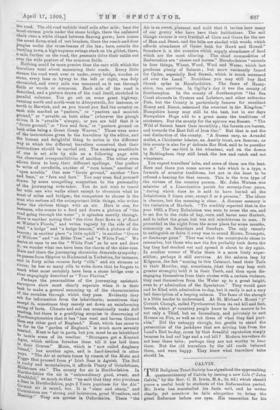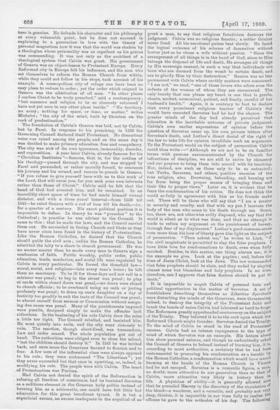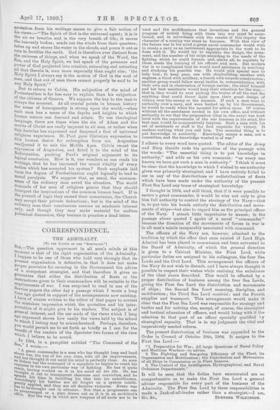CALVIN.
THE Religious Tract Society has signalised the approaching quatercentenary of Calvin by issuing a new Life ("John Calvin," by the Rev. C. H. Irwin, M.A., 2. 6d.) which should prove a useful book to students of the Reformation period. Mr. Irwin has marshalled his facts well, and he writes clearly, yet somehow be fails altogether to bring the great Reformer before our eyes. His veneration for his
hero is genuine. He defends his character and his philosophy at every vulnerable point, but he does not succeed in explaining to a generation in love with the theory of personal magnetism how it was that the world was shaken by• a theologian whose personality was as repellent as his genius was commanding. It was not only as the architect of a theological system that Calvin was great. His government of Geneva was an object-lesson to Protestant Europe. Every Reformed city in Europe felt his influence, and the men who set themselves to reform the Roman Church from within, while they could not follow in his steps, took account of his example. A cosmopolitan city of refuge can have been no easy place to reduce to order ; yet the order which reigned in Geneva was the admiration of all men. "In other places I confess Christ to be truly preached," said a contemporary ; "but manners and religion to be so sincerely reformed I have not yet seen in any other place beside." "No territory, no army; nothing for space, or time, or matter," writes Michelet ; "the city of the mind, built by Stoicism on the rock of predestination."
The foundation of Calvin's Geneva was laid, not by Calvin, but by Forel. In response to his preaching, in 1536 the Governing Council declared itself Protestant. No dissentient voice was raised among the people, and on the same day it was decided to make primary education free and compulsory. The city was sick of its own ignorance, immorality, disorder, and superstition, A year later Calvin, already famous for his " Christian Institutes "—famous, that is, for the outline of his theology—passed through the oity, and was stopped by Farel and persuaded, or rather morally forced, to renounce his journey and his errand, and remain to preach in Geneva. "If you refuse to give yourself here with us to this work of the Lord, God will curse you, for you seek your own interests rather than those of Christ." Calvin said he felt that the hand of God bad arrested him, and he remained. In an incredibly short space of time he had made himself virtual dictator, and with a three years' interval—from 1538 till 1541—he ruled Geneva with a rod of iron till his doath,—i.c., for a quarter of a century. His exact political position it is impossible to define. In theory be was " preacher " to the Cathedral ; in practice he was adviser to the Council. It came to this : that be made the laws, and the Council carried them out. He succeeded in fusing Church and State as they have never since been fused in the history of Protestantism. Like the Roman Catholics, he desired that the Church should guide the civil arm ; unlike the Roman Catholics, he admitted the laity to a share in church government. He was no sooner master than he made every man in Geneva sign a confession of faith. Public worship, public order, public education, trade, sanitation, and social life were regulated by Calvin in every particular. He forced the threefold law— moral, social, and religious—into every man's home ; he left them no sanctuary. To be ill for three days and not call in a minister was penal; to beg in the street was penal ; to play at cards within closed doors was penal,—no doors were closed to church officials ; to be overheard using an oath or jesting profanely was penal; to dress up one's daughter on a day of festivity too gaudily to suit the taste of the Council was penal; to absent oneself from sermon or Communion without assign- ing due cause was penal. Many of the punishments imposed were puerile, designed simply to make the offender look ridiculous. In the beginning of his rule Calvin drew the reins a little too tight. The Council rebelled, and banished him. He went quietly into exile, and the city went riotously to ruin.. The reaction, though short-lived, was tremendous. Law and order ceased. The whole population got out of band. The authorities were obliged even to close the school, "lest the children should destroy it." In 1541 he was invited back, and once more the Genevans learned to flourish and to fear. A few men of the influential class were always opposed to his rule; they were nicknamed "The Libertines "; yet they never succeeded but that once in upsetting, or, indeed, in modifying, his rule. The people were with Calvin. The heart of Protestantism was Puritan.
Had Calvin not denied the spirit of the Reformation in refusing all freedom of conscience, had he banished Servetus as a seditious element in the Genevan body politic instead of burning him as a schismatic, one could have felt little but admiration for this great beneficent tyrant. It is but a superficial excuse, an excuse inadequate to the acquittal of so great a man, to say that religious fanaticism destroys the judgment. Calvin was no religious fanatic ; a colder thinker , never lived. All his emotional pulses beat slowly. He faced the logical outcome of his scheme of damnation without horror just as he chose a wife without 'passion. "Since the arrangement of all things is in the hand of God, since to Him belongs the disposal of life and death, He arranges all things
by His sovereign counsel, in such a way that individuals are born who are doomed from the womb to certain death, and are to glorify Him by their destruction." Reason was no less paramount with Calvin where earthly matters were concerned. "I am not," we read, "one of those lovers who adore even the defects of the woman of whom they are enamoured. The only beauty that can please my heart is one that is gentle, chaste, modest, economical, patient, and finally, careful of her husband's health." Again, it is contrary to fact to declare that every prominent religious teacher of Calvin's day would have executed Servetus had he had the chance. The greater minds of the day had already perceived that toleration is the inevitable outcome of private judgment- Calvin's own earlier expressions of opinion ' before the question of Servetus came up, his own private letters after Servetus's death, and Luther's direct denial of the right 'of the law to take life for opinion invalidate such an argument. To the Protestant world on the subject of persecution Calvin could thus write :—" Although we are not to be on familiar terms with persons excommunicated by the Church for infractions of discipline, we are still to strive by clemency and our prayers to bring them into accord with its teaching. Nor, indeed, are such as these only to be so entreated ; but Turks, Saracens, and others, positive enemies of the true religion, also. Drowning, beheading, and burning are far from being the proper means of bringing them and their like to proper views." Later on, it is evident that be fears the condemnation of his critics. He does not think the world so fully in agreement with him as his friends make out. There will be those who will say that "I am a master in severity and cruelty. and that with my pen I lacerate the body of the man who came to his death through me. Some, too, there are, not otherwise evilly disposed, who say that the world is silent as to what was done, and that no attempt is made to refute my argument on the punishment of heresy, through fear of my displeasure." Luther's good common-seuee even more than his love of liberty gave him light on the subject of persecution. "Thou askest me," be writes to Link, " if the civil magistrate is permitted to slay the false prophets. I have little love for condemnations to death, even when fully merited. Besides, in this matter, one thing alarms me; it is the example we give. Look at the papists; and, before the time of Jesus Christ, look at the Jews. The law commanded that false prophets should be slain, and they ended by slaying almost none but blameless and holy prophets. In no wise, therefore, can I approve that false doctors should be put to death."
It is impossible to acquit Calvin of personal hate and political opportunism in the matter of Servetus. A set of freethinkers describing themselves as Libertine Spirituals were disturbing the minds of the Genevans, were threatening, indeed, to destroy the integrity of the Protestant faith and break the bonds of union Calvin had laboured so herd to forge. The Reformers greatly apprehended controversy on the subject of the Trinity. They believed it to be the rock upon which, the Reformed Church might founder. Servetus denied the Trinity. To the mind of Calvin he stood in the road of Protestant success. Calvin bad an intense repugnance to the type °E mind of which Servetus was an example. His letters about him show personal animus, and though he undoubtedly asked the Council of Geneva to behead instead of burning him, it is, according to most authorities, a certainty that he had been instrumental in procuring his condemnation as a heretic 11 the Roman Catholics, a condemnation which, would have meant burning at the hands of the Roman Church in Vienn° had be not escaped. Servetus is a romantic figure, a ma% no doubt, more attractive to our generation than to that of Calvin, more attractive very likely in history than ill life. A physician of ability—it is generally allowed no°, that he preceded Harvey in the discovery of the circulation ei the blood—a wanderer, and a versatile, and probably not .yell deep, thinker, it is impossible in our time fully to realise 08 offence he gave to the orthodox of his day. The followilig
quotation from his writings seems to give a fair notion of bus "ewe:—" The Spirit of God is the universal agent; it is in the air we breathe, and is the very breath of life; it moves the heavenly bodies; sends out the winds from their quarters ; takes up and stores the water in the clouds, and porn's it out as rain to fertilise the earth. God is therefore ever distinct from the universe of things, and when we speak of the Word, the Son, and the Holy Spirit, we but speak of the presence and Power of God projected into creation, animating and actuating all that therein is, man more especially than aught else; 'the Rol' Spirit I always say is the motion of God in the soul of tan, and that out of man there cannot properly be said to be any Holy Spirit.'" But to return to Calvin. His subjection of the mind . of Protestantism is far less easy to explain than his subjection of the citizens of Geneva. We suppose the key to the man is always the moment. It all crucial points in human history the sense of homogeneity is strong upon the world,—when each man has a sense of the depths and heights to which human nature can descend and attain. To use theological language, there are times when the sin of Adam and the merits of Christ are really imputed to all men, or rather when this doctrine has expressed and deepened a fact of universal religious experience. St. Paul gave Christian expression to this human desire for redemption from sin. Augustine readjusted it to suit the Middle Ages. Calvin recast the expression of Augustine, and fitted it to the mind of the Reformation, pushing Paul's original argument to its logical conclusion. How is it, one wonders as one reads his writings, that he has increased the moral vitality of every nation which has accepted his system P Such emphasis laid utiOn the dogma of Predestination ought logically to lead to Moral paralysis. We suppose that, as usual, the common- Benue of the ordinary man saved the situation. The world
einands of her men of religious genius that they should Interpret the inspirations of the common human heart. If in the pursuit of logic they exceed their commission, the Church may accept their private deductions ; but in the mind of . the ordinary man their conclusions assume an academic interest Only, and though they may make material for endless Polemical discussion, they become in practice a dead letter.








































 Previous page
Previous page